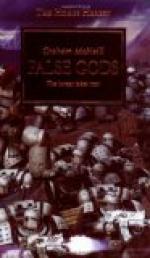“This is my mummy,” she went on, nodding toward the gilded case, “the shell from which my soul fled three thousand years ago. Since then it has been upon its wanderings, living in birds and beasts, that the will of Osiris might be done.”
Again she paused, pleased, apparently, with the respectful interest which Simpkins showed. And, indeed, he was interested; for his reading on early Egyptian beliefs enabled him to follow the current of her madness and to trace it back to its sources. So he nodded again, and she continued:
“Through all these weary centuries, Amosis, my husband, has been with me, first as king—ah! those days in hundred-gated Thebes—and when at last my soul lodged in this body he found me out again. As boy and girl we loved, as man and woman we were married. And the days that followed were as happy as those old days when we ruled an empire. Not that we remembered then. The memory of it all but just came back to me two months ago.”
“Did you tell the Doctor about it?” asked Simpkins, in the wheedling tone of a physician asking a child to put out her tongue.
“I tried to stir his memory gently, by careless hints, a word dropped here and there, recalling some bright triumph of his reign, some splendid battle, but there was no response. And so I waited, hoping that of itself his memory might quicken, as mine had.”
“Did Brander know anything about this—er—extraordinary swapping around of souls?”
“Not then——” began the woman, but Simpkins cut her short by jumping to his feet with a cry of “What’s that!” and his voice was sharp with fear. For in that silent second, while he waited for her answer, he had heard a noise out in the hall, the sound of stealthy feet behind the veil, and he had seen the woman’s eyes gleam triumph.
Again the terror that had mastered him an hour before leaped into life, and quakingly he faced the darkness. But he saw nothing—only the shifting shadows, the crimson blotches crawling on the veil, and the vague outlines of the coffined dead.
He looked back to the woman. Her face was masklike. It must have been a fancy, a vibration of his own tense nerves. But none the less, he rearranged the light, that while its rays shone clear on Mrs. Athelstone, he might be in the shadow, and set his chair back close against the wall, that both the woman and the hall might be well in his eye. And when he sat down again one hand clutched tight the butt of a revolver.
[Illustration]
[Illustration]
VIII
“You seem strangely disturbed, Simpkins,” said Mrs. Athelstone quietly; but he fancied that there was a note of malicious pleasure in her voice. “Has anything happened to alarm you?”
“I thought I heard a slight noise, as if something were moving behind me. Perhaps a mummy was breaking out of its case,” he answered, but his voice was scarcely steady enough for the flippancy of his speech.




